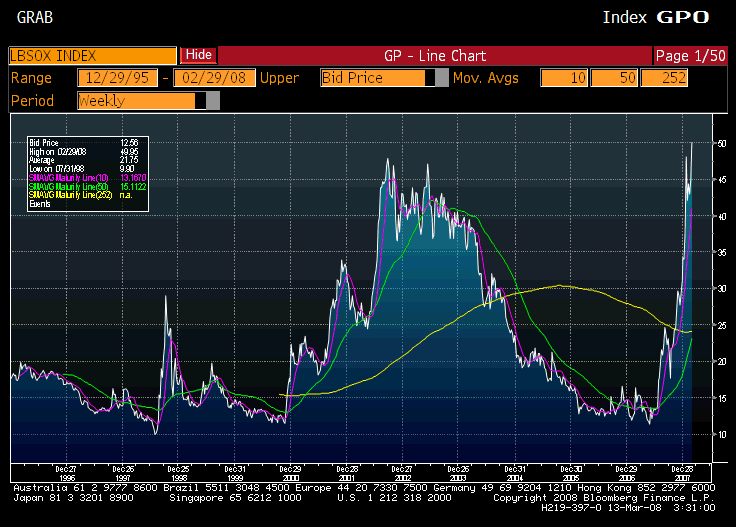1) I typically don’t comment on whether we are in a recession or not, because I don’t think that it is relevant. I would rather look at industry performance separate from the performance of the US economy, because the world is more integrated than it used to be. Energy, Basic Materials, and Industrials are hot. Financials are in trouble, excluding life and P&C insurers. Retail and Consumer Discretionary are soft. What is levered to US demand is not doing so well, but what is demanded globally is doing well. Much of the developed world has over-leverage problems. Isn’t that a richer view than trying to analyze whether the US will have two consecutive quarters of negative real GDP growth?
2) So Moody’s is moving Munis to the same scale as corporates? Well, good, but don’t expect yields to change much. The muni market is dominated by buyers that knew that the muni ratings were overly tough, and they priced for it accordingly. The same is true of the structured product markets, where the ratings were too liberal… sophisticated investors knew about the liberality, which is why spreads were wider there than for corporates.
3) Back to the voting machine versus the weighing machine a la Ben Graham. It is much easier to short credit via CDS, than to borrow bonds and sell them. There is a cost, though. The CDS often trade at considerably wider spreads than the cash bonds. It’s not as if the cash bond owners are dumb; they are probably a better reflection of the true expectation of default losses, because they cannot be traded as easily. Once the notional amount of CDS trading versus cash bonds gets up to a certain multiple, the technicals of the CDS trading decouple from the underlying economics of the bond, whether the bond stays current or defaults. In a default, often the need to buy a bond to deliver pushes the price of a defaulted bond above its intrinsic value. Since so many purchased insurance versus the true need for insurance, this is no surprise.. it’s not much different than overcapacity in the insurance industry.
4) If you want a quick summary of the troubles in the residential mortgage market, look no further than the The Lehman Brothers Short Swaption Volatility Index. The panic level for short term options on swaps is above where it was for LTCM, and the credit troubles of 2002. What a take-off in seven months, huh?
5) Found a bunch of neat charts on the mortgage mess over at the WSJ website.
6) I have always disliked the concept of core inflation. Now that food and fuel are the main drivers of inflation, can we quietly bury the concept? As I have pointed out before, it doesn’t do well at predicting the unadjusted CPI. Oh, and here’s a fresh post from Naked Capitalism on the topic of understating inflation. Makes my article at RealMoney on understating inflation look positively tame.
7) The rating agencies play games, but so do the companies that are rated. MBIA doesn’t want to be downgraded by Fitch, so they ask that their rating be withdrawn. Well, tough. Fitch won’t give up that easily. Personally, I like it when the rating agencies fight back.
8 ) Jim Cramer asks if Bank of America will abandon Countrywide, and concludes that they will abandon the bid. Personally, I think it would be wise to abandon the bid, but large companies like Bank of America sometimes don’t move rapidly enough. At this point, it would be cheaper to buy another smaller mortgage company, and then grow it rapidly when the housing market bounces back in 2010.
9) Writing for RealMoney 2004-2006, I wasted a certain amount of space talking about home equity loans, and how they would be another big problem for the banking system. Well, we are there now. No surprise; shouldn’t we have expected second liens to have come under stress, when first liens are so stressed?
10) In crises, hedge funds and mortgage REITs financed by short-term repo financing are unstable. No surprise that we are seeing an uptick in failures.
11) As I have stated before, I am not surprised that there is more talk of abandoning currency pegs to the US dollar. That said, it is a getting dragged kicking and screaming type of phenomenon. Countries get used to pegs, because it makes life easy for policymakers. But when inflation or deflation gets to be odious, eventually they make the move. Much of the world pegged to the US dollar is importing our inflationary monetary policy.
12) Finally, something that leaves me a little sad, people using their 401(k)s to stay current on their mortgages. You can see that they love their homes, as they are giving up an asset that is protected in bankruptcy, to fund an asset that is not protected (in most states). Personally, I would give up the home, and go rent, and save my pension money, but to each his own here.


2) I think yields will change. The impetus for the change in the ratings is that the current rating system penalizes municipalities, which rarely default. With a rating system that more closely reflects the true default risk of municipalities (well, lack thereof), many municipalities will issue new bonds with lower coupons than they currently do. Lower coupons implies lower yields. It’s not clear how investors will react to lower yields than they are use to.
8) I didn’t read the BAC acquisition of CFC as seeking their origination channels, but as seeking their servicing operations/portfolio. CFC services approximately $1.5 trillion (or 25% of outstanding mortgages) which would give BAC a nice stream of cash.